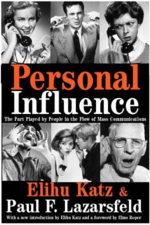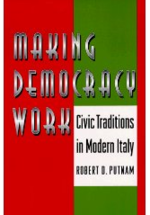Over the past weekend I caught up on some reading I had been meaning to get to for some time, mostly research papers and some Academy of Human Resource Development journals for an upcoming article I am helping to write. After making my way though an article or two, and checking some citations to dig deeper into some areas I found myself really amazed on the dates of publication on some of the most seminal works in the areas of what today would be considered 'social networking'.
Some examples:
The Strength of Weak Ties - Mark Granovetter's theory of how 'weak' or more casual relationships in a network are more effective at diffusing or spreading information across the entire organization, enterprise or society, the theory that essentially underpins much of the design philosophies of community building, corporate social networking, and social network analysis today was originally published in 1973.
In that work, while asserting that in making important personal decisions most people do not rely on or act on recommendations delivered via forms of mass communication, unless these 'mass-media' recommendations are also reinforced by personal contacts, Granovetter cites the title Personal Influence by Katz and Lazarsfeld, published in 1955.
via forms of mass communication, unless these 'mass-media' recommendations are also reinforced by personal contacts, Granovetter cites the title Personal Influence by Katz and Lazarsfeld, published in 1955.
Some of the positions advanced first in by Katz and Lazarsfeld in 1955 are often echoed in current articles and thinking around social media and social networking. Engage customers on their terms, build a community for your fans and supporters, stop broadcasting your message in an impersonal format, people don't trust corporate marketing speak, etc. all have some basis in theory from Personal Influence.
Lastly, in the past few weeks I noticed several excellent blog posts discussing 'Trust'. A few bloggers explored trust in the workplace and the importance of fostering trusting environments. See HR Bartender, the Compensation Cafe, and HR Observations, for some recent examinations on Trust in the workplace.
After reading those posts, I thought about offering my take on how trust might impact knowledge sharing; particularly in the context of online collaboration and knowledge management tools. As more organizations seek to adopt these platforms, to take advantage of and to try to enhance the organizational social network, the idea of trust is critically important.
In this research, I stumbled upon an incredible source for better understanding of social networks and  social capital formation, a title from 1983 called Making Democracy Work: Civic Traditions in Modern Italy by Robert D. Putnam.
social capital formation, a title from 1983 called Making Democracy Work: Civic Traditions in Modern Italy by Robert D. Putnam.
What does a text on the political structure and institutions in Italy have to do with corporate social networking, collaboration, or workplace trust? Actually quite a bit. Chapter 6 of Making Democracy Work titled 'Social Capital and Institutional Success' focuses on the essential elements necessary for the development of social capital in organizations, trust, norms, and networks. On the idea of trust, Putnam strongly asserts the link between trust and the end goals of many of these new technology-based initiatives, 'Trust lubricates collaboration'. Putnam further explores the fundamental conditions needed to build trust in networks, like reciprocity and the virtuous cycle effect.
The point of all of this?
I think that at times many of us that participate, advocate, and attempt to implement tools and technologies for social networking, collaboration, and knowledge management think that we are truly in uncharted waters. We can at times, get beguiled by the notion of 'newness'. Since Twitter, Facebook, wikis, blogs, etc. are all relatively recent inventions, it is easy to think that the scholars and researchers of the past don't have much to offer us today. My experience with just the three works I mentioned above (three out of potentially thousands) tells me that ignoring or dismissing these works as irrelevant just because the 'tools' are new would be a mistake.
My recommendation to you - take the half hour you may have spent reading more 'How to be more effective on Twitter' posts and read the Strength of Weak Ties this week. Press the pause button on 'Personal Branding' for an evening and read Chapter 6 of Putnam. I guarantee you will find something in there that will help you today, tomorrow, next week, next year.
I would love your comments and recommendations on other 'classic' works that you swear by.